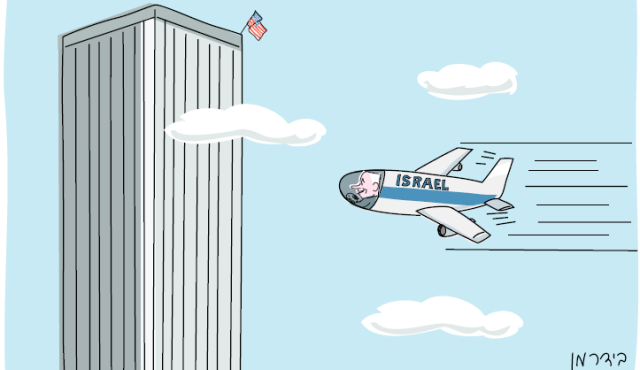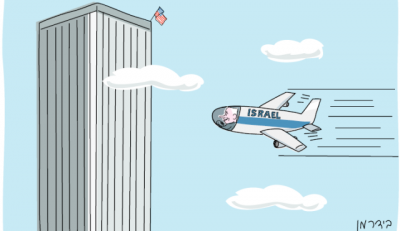Though I don’t agree with them on everything (no one should agree with anything on everything), I ordinarily like Haaretz.
I also normally find writing in to complain a bit gauche. Whether it’s about food, internet service, or editorial positions, I usually either don’t think it’s worth the bother (“My internet’s being slow? Good, I should be reading more anyway!”) or else I have the image of people like the Kilnghoffer protesters in the back of my mind reminding me that maybe my protest will actually say a lot more about me than about the thing I find so offensive.
But today’s editorial cartoon by Amos Biderman in Haaretz , seen above, brought me over the edge.
It shows Bibi in a plane marked “Israel” about to ram into a WTC-esque tower with an American flag dangling from the top. I hate it because I want so much to agree with it but can’t—Netanyahu is indeed “chickenshit” and the new settlement proposal is indeed suicidal for not just US-Israel relations but for any hope of peace in the immediate future. Yet, the 9/11 imagery used is offensive and completely inappropriate, if not outright dangerous—in the wake of increasing anti-Semitism, including the posters found at UC Santa Barbara last month blaming Jews for 9/11, this cartoon just isn’t funny. As editor of New Voices, every so often, I’ll get a pingback when one of our articles is quoted by another website, and, a disturbingly high amount of the time, that website will be unabashedly anti-Semitic. And, yes, I don’t mean (only) anti-Zionist, but plain old-fashioned anti-Semitic. It’s not that our articles say bad things about the Jewish people—they don’t—it’s that, as those possessed by irrational hatreds do, anti-Semites will grasp at any straw they can in support of their cause. Though we may not be able to stop those who hate us from reading some of the more critical things we write about ourselves in the worst possible way, we also shouldn’t just hand it to them—if a Jewish person wants to draw a caricature of himself to use as his Facebook photo, he shouldn’t make himself look like a character on the cover of the Protocols of the Elders of Zion. So I always reject those pingbacks.
Similarly, here, I wanted to speak out against fueling a dangerous lie. That cartoon was irresponsible and has great potential to ultimately do far more damage to Israel and the to Jewish people in general than it does to the policies of Netanyahu or Likud. True, it may not be as damaging to Jews globally as his policies are, but here was a perfect opportunity to respond with something witty and insightful, but he just made it worse. Those are my thoughts, and I tried to let Haaretz know them as best I could within their 200-character feedback limit.
***
A half-hour or so after I sent in my complaint, I heard back from Haaretz. They sent me a link to Biderman’s response to the backlash, where he explained that his only intention was mocking Bibi for “acting like a bull in a china shop with the United States,” and, “It was certainly not my intention to insult or upset anyone … I wasn’t sufficiently aware of the great sensitivity that 9/11 holds for Americans.” But I think the most important quote is this:
I have drawn cartoons depicting every war that Israel has fought, including the Yom Kippur War – which I was involved in – where we suffered thousands of casualties. I have used some of Israel’s greatest tragedies as the background for my cartoon. In one of my recent cartoons, which poked fun at the so-called Milky protest, I even referenced the Gestapo. I never imagined that by using an image that evoked 9/11 I would cause such a storm.
In protesting Biderman’s lack of concern for American sensitivity, I forgot about (though I am certainly familiar with) Israeli desensitivity. As I know from many uncomfortable experiences, Israeli directness often roils (overly?) sensitive Americans like me. I don’t see either quality as inherently better or worse than the other, they are rather the natural consequences of a culture that is largely isolated from terror on one side interacting with one that, tragically, has daily experiences of it on the other.
All that aside, it seems his apology misses the point. This isn’t about me being sensitive over 9/11, it’s about the danger of tying Israel to it, and the fact that he doesn’t even mention that I think says something extremely important about the differences between Diaspora and Israeli Jewry—why should he have thought of that? In the Jewish State, the idea that Israel would have had anything to do with 9/11 is probably just as alien as still being so sensitive over a piguah that happened over 13 years ago.
Now, as I look again at Bibi’s cartoon plane set on a collision-course into the American tower, I’m wincing not only at Bibi’s kamikaze politics, but at the shattering of my own psychological distance from Israelis.
If this cartoon can serve as a way for Israeli and Diaspora Jews to begin to not only understand how different their worlds are, but can start a constructive dialogue towards bridging that gap, then I think it could actually have potential to do us a lot more good than harm.
I’m so happy I complained.
Derek M. Kwait graduated from the University of Pittsburgh and is editor in chief of New Voices.


